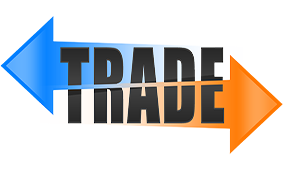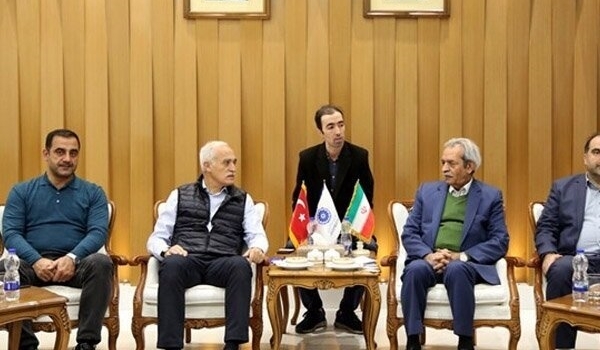
Iran, Turkey after Further Private Sector Cooperation

TEHRAN (FNA)- Chairman of Iran’s Chamber of Commerce, Industries, Mines and Agriculture (ICCIMA) Qolamhossein Shafyee and Chairman of the Foreign Economic Relations Board of Turkey (DEİK) Nail Olpak, in a meeting in Tehran, exchanged views on ways to boost cooperation between the private sectors of the two countries and to bolster national currency use in bilateral trade.
Shafyee and Olpak, in a Monday meeting in the Iranian capital city of Tehran, said that their respective countries are poised to reach $30 billion worth of trade transactions between the two sides.
The two then discussed the development of cooperation of private sectors of the two countries, the use of national currencies and implementation of Preferential Trade Agreement (PTA).
Shafyee pointed to an upcoming conference in Turkey to be attended by high-ranking officials of public and private investors of the Organization of Islamic Cooperation (OIC), saying that an Iranian trade and business delegation will take part at this conference.
It is hoped that this conference will pave the way for the development of bilateral cooperation between Iran and Turkey, Shafyee added.
He then put special emphasis on the history of economic relations between Iran and Turkey and added, “Iran hails Turkish position against the US sanctions imposed against us.”
Elsewhere in his remarks, Shafyee pointed to the compilation of an economic roadmap between Iran and Turkey and targeting for $30 billion bilateral trade and added, “despite bilateral talks, it is a matter of regret to say that trade and economic exchange between the two countries slumped by 30 percent in the first six months of the current year (from March 21 to Sept. 22).”
He called on government officials of the two countries to support private sectors with regard to the use of national currencies in economic exchanges.
The Chairman of ICCIMA said that the two countries should put special emphasis on the foreign investment, cooperation in the field of transport, transit and tourism.
The two countries of Iran and Turkey have an influential and constructive role in the Economic Cooperation Organization (ECO), he stressed.
Late in September, President Recep Tayyip Erdogan stated that it's “impossible” for Ankara to stop purchasing oil and natural gas from Tehran, suggesting that Turkey will disregard a raft of US sanctions now imposed on Iran’s energy sector.
Erdogan told reporters aboard his return flight from the UN General Assembly meeting in New York that Ankara would not be deterred by American sanctions on Iran’s oil and gas trades, and said Turkey has no interest in cutting ties with the Islamic Republic.
The US, as part of President Donald Trump’s so-called “maximum pressure” campaign, has been seeking to cripple Iran’s economy through what Washington refers to as “toughest ever” sanctions.
The campaign, which began in May 2018 after Trump abandoned the 2015 Iran nuclear deal, has witnessed several rounds of sanctions that specifically targeted Tehran’s oil exports and sought, unsuccessfully, to bring them to zero.
Turkey is heavily reliant on energy and petrochemicals imported from Iran.
The US, along with its ally Saudi Arabia, recently blamed Iran for attacks on a pair of Saudi oil facilities, despite Yemen’s Houthi Ansarullah claiming responsibility for the incident, and Tehran denying any involvement. Erdogan has so far refrained from joining in on the finger-pointing, refusing to jump on the Washington-Riyadh ‘blame Iran’ bandwagon.



Trump weighs using $2 billion in CHIPS Act funding for critical minerals

Codelco cuts 2025 copper forecast after El Teniente mine collapse

Electra converts debt, launches $30M raise to jumpstart stalled cobalt refinery

Barrick’s Reko Diq in line for $410M ADB backing

Abcourt readies Sleeping Giant mill to pour first gold since 2014

Nevada army depot to serve as base for first US strategic minerals stockpile

SQM boosts lithium supply plans as prices flick higher

Viridis unveils 200Mt initial reserve for Brazil rare earth project

Tailings could meet much of US critical mineral demand – study

Kyrgyzstan kicks off underground gold mining at Kumtor

Kyrgyzstan kicks off underground gold mining at Kumtor

KoBold Metals granted lithium exploration rights in Congo

Freeport Indonesia to wrap up Gresik plant repairs by early September

Energy Fuels soars on Vulcan Elements partnership

Northern Dynasty sticks to proposal in battle to lift Pebble mine veto

Giustra-backed mining firm teams up with informal miners in Colombia

Critical Metals signs agreement to supply rare earth to US government-funded facility

China extends rare earth controls to imported material

Galan Lithium proceeds with $13M financing for Argentina project

Kyrgyzstan kicks off underground gold mining at Kumtor

Freeport Indonesia to wrap up Gresik plant repairs by early September

Energy Fuels soars on Vulcan Elements partnership

Northern Dynasty sticks to proposal in battle to lift Pebble mine veto

Giustra-backed mining firm teams up with informal miners in Colombia

Critical Metals signs agreement to supply rare earth to US government-funded facility

China extends rare earth controls to imported material

Galan Lithium proceeds with $13M financing for Argentina project

Silver price touches $39 as market weighs rate cut outlook

















